Archbishop Lefebvre & Conciliar Sacraments—Do they 'come from the Church?'
Traditional doctrine and Archbishop Marcel Lefebvre show that the reformed Novus Ordo liturgical rites could not have come from the Church with her approval or sanction.
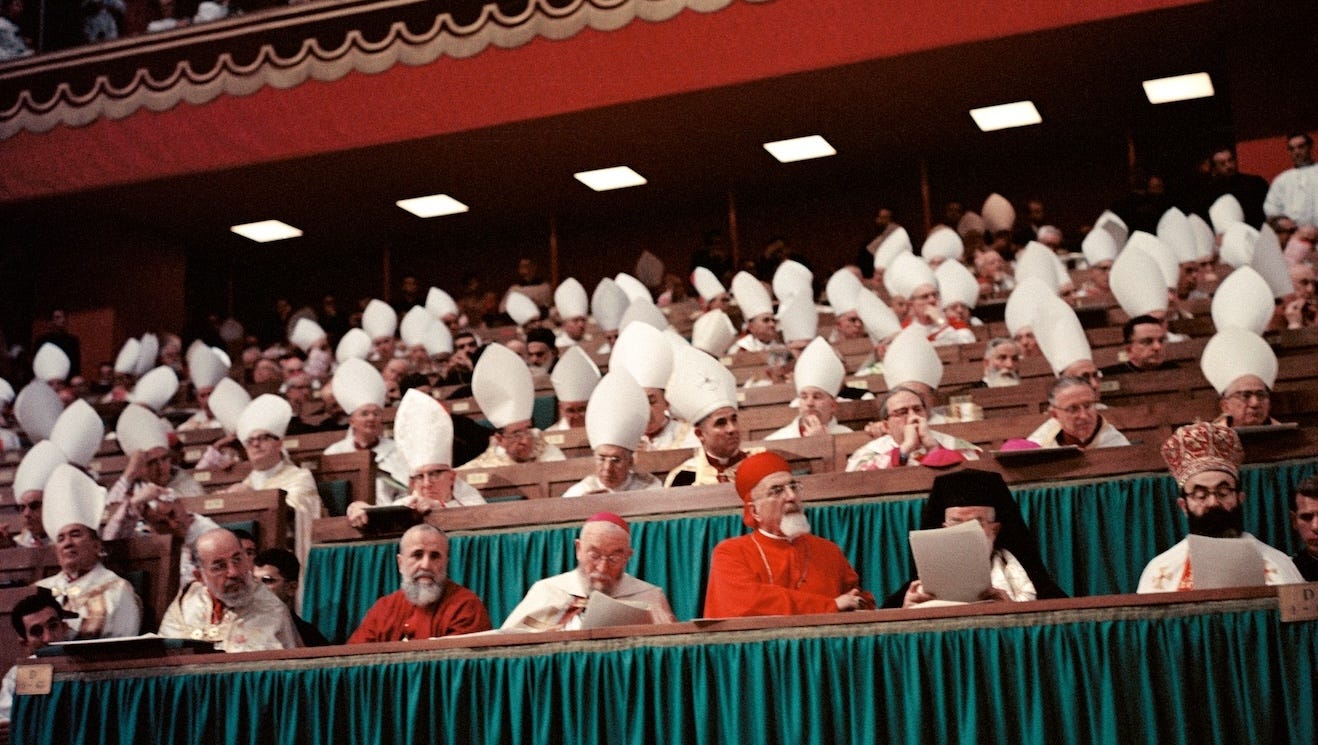
Traditional doctrine and Archbishop Marcel Lefebvre show that the reformed Novus Ordo liturgical rites could not have come from the Church with her approval or sanction.
Introduction
This is the second part of a series on Archbishop Marcel Lefebvre and the reformed rites of the sacraments.
This series is presenting three main arguments, based on Lefebvre’s words, actions and principles, which establish the necessity of a universal practice of conditional ordination/consecration for all whose holy orders depend on the reformed Novus Ordo sacramental rites.
The first part presented “the pastoral argument” for this conclusion. In that part, we discussed Lefebvre’s attitude towards the rite of confirmation reformed following Vatican II. We saw that in explaining his pastoral practice, he explicitly recognised the legitimacy of doubt about the reformed rite itself, and was prepared to act outside of the ordinary way in order to give the faithful certainty and peace.
This article will present “the theological argument” for this thesis. We will show that a position of universal and absolute doubt about some of the reformed sacramental rites (including Holy Orders) flows from Archbishop Lefebvre’s words, premises and argumentation; and that the Archbishop not only tolerated this position, but more or less embraced it himself.
In the next part, we will discuss “the practical argument” for this conclusion, which is based on Lefebvre’s analysis of the widespread carelessness and possibly defective sacramental intention.
Overview of “the theological argument”
Here is the outline of the argument which can be derived from the juxtaposition of Lefebvre’s analysis of the crisis and traditional Catholic theology.
The reformed liturgical and sacramental rites “do not come from the Church,” and therefore do not have her approval or sanction.
Because of this, we have no prima facie guarantee of validity for those reformed rites which have endured a change to their matter or form. This is the case for four of the seven sacraments, namely:
Confirmation
Holy Orders
Eucharist
Extreme unction.
Without such a guarantee, we may be unable to attain certainty of validity for one or more of these four sacraments.
If this is so, we would be obliged to abstain from receiving sacraments conferred in such rites, and those which are doubtful should be repeated conditionally.
This applies especially to the reformed rites confirmation and of episcopal consecration, as well as to priestly ordination, extreme unction and the eucharist, as discussed below:
Distinctions of types of doubt
In order to discuss this question, it is necessary to make a few distinctions about three grounds for doubt about any given administration of the sacraments in the new rites. The comments on Lefebvre’s views will be proved in due course.
Extension
Universal doubt – the doubt applies to all administrations of a given rite, at least in the form of a rebuttable presumption
Particular doubt – the doubt applies to a subset of administrations.
Archbishop Lefebvre’s words and actions generally point towards a universal or general presumption against the validity of the sacraments conferred with the new rites.
Rationale
Extrinsic doubt – the doubt is based on how an otherwise valid sacramental rite was administered (e.g., defective use of matter and form or defective intention). This is similar to the “particular doubt” mentioned above, but is not identical.
Intrinsic doubt – the doubt is based on the sacramental rite itself (e.g., changes to matter, form or other aspects of the rite itself)
Much of the time, Lefebvre’s doubts were extrinsic to the rite itself, based on concerns about:
Defective sacramental intention on the part of the minister
Widespread carelessness in administration amongst the Novus Ordo clergy.
However, Lefebvre’s doubts were at times more intrinsic to the reformed rites, in that he expressed doubt about the rites themselves, whether that was based on:
Changes to the matter (e.g., the permission to use vegetable oils other than olive oil for confirmation)
Changes to the form (e.g., as discussed, he at times expressed concerns and reservations regarding the form of confirmation).
In addition, Lefebvre also acknowledged that the sacraments could be doubtful or invalid because of uncertainty as to whether the minister had been validly ordained or consecrated.1
Resolvability
Absolute doubt – the doubt cannot be resolved
Conditional doubt – the doubt can be resolved (e.g., through investigation, eyewitnesses, etc.)
At times, Lefebvre’s doubts seem to have been conditional, in the sense that they could be resolved in some way. At other times, his doubts appeared to be more absolute, in the sense that resolution (whether of validity or invalidity) would be basically impossible.
Over time, his doubts about the validity of certain reformed sacramental rites appeared to become more and more universal and absolute (irresolvable) in practice.
In our opinion, universal, intrinsic and absolute doubt about at least the four reformed rites mentioned necessarily flows from the Archbishop’s analysis of the crisis. It also would appear to be the safest and most reasonable position to hold in our day.
Having set this out, let us set out clearly the traditional theology of the Church and see what it tells us about Lefebvre’s analysis of the crisis.
This was an advanced preview post for members who choose to support us with a monthly or annual subscription.
Our work takes a lot of time and energy. Please consider subscribing if you like it.
We make members-only material freely available to clergy, priests and seminarians upon request. Please subscribe and reply to the email if this applies to you.
You might also want to take a look at this:
The Theological Argument for universal conditional repetition
First Fundamental Principle – Infallibility
It is an axiom of traditional theology that the Church is infallible in her liturgical rites – at least, in those which could be considered as universal disciplinary laws, as would be the case for the reformed rites of the sacraments.
This axiom is established by various authorities and arguments, including the teaching of the Council of Trent and Pius VI’s Auctorem Fidei. Pope Gregory XVI specifically applied this to the sacraments, asking the rhetorical question:
“Is it possible that the Church, which is the pillar and ground of truth and which is continually receiving from the Holy Spirit the teaching of all truth, could this Church ordain, grant, permit what would turn to the detriment of the soul’s salvation, to the contempt and harm of a sacrament instituted by Christ?”2
It is obvious from the purpose of the Church herself, and the way in which universal disciplinary laws are, as the theologian Van Noort says, “for all practical purposes, tantamount” to doctrinal definitions.3
It is impossible to claim that this axiom only to the traditional liturgy in use at the time of the decrees. It is also impossible to claim that it applies only to rites which are made the object of an obligation or even an exclusive obligation.4
On the contrary, it applies to any and all sacramental rites approved for use in the Catholic Church.
This point is established further with magisterial and theological texts here:
What this axiom means that such liturgical rites cannot contain any “incentives to impiety” or any kind of dangerous discipline which departs from the rule of faith.
There is no principle or authority which justifies us in “rethinking” this axiom as meaning that the Church can give us or approve of harmful, dangerous, evil or non-Catholic rites, “so long as they remain valid.”
As Pius XII taught in Mediator Dei:
“In the sacred liturgy we profess the Catholic faith explicitly and openly, not only by the celebration of the mysteries, and by offering the holy sacrifice and administering the sacraments, but also by saying or singing the credo or Symbol of the faith [...]
“The entire liturgy, therefore, has the Catholic faith for its content, inasmuch as it bears public witness to the faith of the Church."5 (Emphasis added)
Therefore, the Church’s approved liturgical rites – including those pertaining to the sacraments – are infallibly guaranteed not just to be valid, but also to be good, wholesome, safe, and expressive of the Catholic Faith. As Pius XII taught in Mystici Corporis:
“Certainly the loving Mother is spotless in the Sacraments by which she gives birth to and nourishes her children; in the faith which she has always preserved inviolate; in her sacred laws imposed on all [...]”6
Second Fundamental Principle – The New Mass is bad in itself
In 2021, Fr Jean-Michel Gleize provided an analysis of one the articles in the “Declaration of Fidelity to the Positions of the Priestly Society of Saint Pius X” professed by seminarians, namely that “the new rite is in itself bad.”7
An essay published on the SSPX websites stated that “the New Mass is evil in and of itself regardless of the circumstances.”8
In a published letter to The Remnant from 1989, Fr François Laisney states that “the Mass can be said to be bad and it is really bad,” and appears to concede that the Archbishop held that “the New Mass can be considered bad in itself.”9
This idea is indeed nothing more than a faithful summary of Archbishop Lefebvre’s own statements throughout the post-conciliar period.
In 1974, Archbishop Lefebvre delivered a damning analysis of entire body of conciliar reforms and concluded that the only possible response for faithful Catholics is “a categorical refusal to accept this Reformation”:
“All these reforms, indeed, have contributed and are still contributing to the destruction of the Church, to the ruin of the priesthood, to the abolition of the Sacrifice of the Mass and of the sacraments…
“It is impossible to modify profoundly the lex orandi without modifying the lex credendi. To the Novus Ordo Missae correspond a new catechism, a new priesthood, new seminaries, a charismatic Pentecostal Church—all things opposed to orthodoxy and the perennial teaching of the Church.
“This Reformation, born of Liberalism and Modernism, is poisoned through and through; it derives from heresy and ends in heresy, even if all its acts are not formally heretical. It is therefore impossible for any conscientious and faithful Catholic to espouse this Reformation or to submit to it in any way whatsoever.
“The only attitude of faithfulness to the Church and Catholic doctrine, in view of our salvation, is a categorical refusal to accept this Reformation.”10
In addition to the text above, Lefebvre expressed similar ideas in 1976, going so far as to refer to an entirely new religion:
“We are not of this religion. We do not accept this new religion. We are of the religion of all time, of the Catholic religion. We are not of that universal religion, as they call it today. It is no longer the Catholic religion. We are not of that liberal, modernist religion that has its worship, its priests, its faith, its catechisms, its Bible.”11
Such quotes could multiplied.
Nor were these ideas unique to Lefebvre. It was strikingly expressed by Cardinals Ottaviani and Bacci in the so-called “Ottaviani Intervention”:
“[T]he Novus Ordo Mass represents, overall and in its details, a striking departure from the Catholic theology of the Mass as it was elaborated in Session XXII of the Council of Trent.”12
Notwithstanding a possible period of an uncertainty on the Archbishop’s part in the years immediately following the Council, the non-Catholic and harmful nature of the reforms is central to the Archbishop’s analysis of the post-conciliar crisis.
According to this analysis, the New Mass is harmful in itself, an incentive to impiety, and fails to serve as a profession of the Catholic faith.
Clarifying the second principle: the unity of the reform
It is clear that the New Mass does not stand alone, and it is also clear from the texts above that Lefebvre did not treat it as standing alone either. This is also clear throughout the words and actions of his career.
In short, the new Mass is a part (if not the chief part) of the wider liturgical reform, which is itself a part of a wider programme of conciliar reform. As we saw, the Archbishop went so far as to call this programme a “Reformation” which was “poisoned through and through”.
In 1977 – which is still relatively early, hence the possible note of uncertainty in his answer – Lefebvre asked his seminarians:
“What should be our attitude towards the New Mass and thus towards the whole liturgical reform, including the reform of the breviary, the liturgical calendar, the rite of the dead, etc.?”13
In his answer, Lefebvre accepts the terms of the question – namely, that our attitude to the Novus Ordo Mass will determine our attitude towards the wider conciliar reforms, of which it is a part.
After explaining various problems (including doubts about the validity), the Archbishop states that there is a duty to avoid the reformed rites. He acknowledges the seriousness of the arguments pointing towards intrinsic invalidity, even if he did not think that these arguments were certain:
“Here again, our attitude depends on how we define this reform. If we consider this reformed liturgy to be heretical and invalid – either because of the changes made to the matter and form, or because of the reformer's intention embedded in the new rite that contradicts the intention of the Catholic Church – it is obvious that we are forbidden to participate in these reformed rites, as we would be participating in a sacrilegious action.
“This opinion is based on serious reasons, though not absolutely evident.”14
Let’s be clear: saying that arguments for invalidity are “based on serious reasons, though not absolutely evident” is an acknowledgment that the rites are doubtful – and that these arguments are legitimate, even if not certain.
He concludes:
“[I]t is a duty to habitually abstain, and to only accept attending in exceptional cases, such as a wedding or a funeral, and only if one has the moral certainty that the Mass is valid and not sacrilegious.
“And this applies to the whole liturgical reform.”15 (Emphasis added)
As is clear, Lefebvre accepted the terms of the question: the reformed rites stand together as a unity. In passing, the rationale for the criticisms above, levelled by Fr Laisney and others, apply no less to the whole reform than the Novus Ordo Missae.
Further, these reformed rites and the wider conciliar reform all came into the world from the same putative authorities. These putative authorities were animated by the same spirit and agenda, which Lefebvre said was “opposed to orthodoxy and the perennial teaching of the Church.”
He treated this network of reforms as such, as shown by the texts above and in his other words and actions. In other words, in his view, the reformed rites stand and fall together.
The apparently impossible dilemma
To restate the point: Lefebvre stated on several occasions that the Novus Ordo Mass, along with the accompanying reforms to the other sacramental rites, are harmful in themselves, incentives to impiety, and fail to serve as a profession of the Catholic faith.
The problem is that according to Catholic teaching and theology, it is impossible to say such things about the Church’s approved sacramental rites. Those who do say so, are in a very dangerous position of ultimately denying the indefectibility and holiness of the Church.
Nonetheless, it is evident that Lefebvre was correct. How are we to reconcile this shocking analysis with the infallibility of the Church in her liturgical rites?
Are we compelled to admit that the Church, which Pius XII said was “spotless in her sacraments”, has given us a set of harmful, poisonous and protestantised rites, which we are duty-bound to reject and avoid?
Such an idea is impossible for any Catholic to accept. It should be especially impossible for any traditionalist to accept, as it is self-defeating and leads to greater problems than it presumes to resolve. We cannot “rethink” pre-conciliar magisterial teaching or theology in order to explain the post-conciliar liturgy and crisis. No-one wants to assert that the Church has defected since the Council: but asserting that she had defected before it is no solution at all.
There is only one route out of this dilemma: exonerating the Church of responsibility for these reforms. We must, in other words, say that these reforms do not come to us from the Church and do not have her approval or sanction.
This may sound like a very bizarre idea, because they do appear to have come to us from the Church.
But in fact, this conclusion was expressed and implied by the Archbishop and other SSPX figures on several occasions.
First conclusion from the harmfulness of the reformed rites – they are not from the Church
At the Archbishop’s inquiry before the CDF in 1979, he was asked how he could make such criticisms of a rite which had come from the Church. This is the question and his answer:
QUESTION: “Do you hold that a faithful Catholic can think and say that a sacramental rite, in particular that of the Mass, approved and promulgated by the Sovereign Pontiff, can be out of conformity with the Catholic faith or ‘favoring heresy?’”
ANSWER: “That rite in itself does not profess the Catholic faith in as clear a manner as did the old Ordo Missae, and consequently it can favor heresy. But I do not know to whom to attribute it, nor if the Pope is responsible for it.
“What is astounding is that an Ordo Missae savoring of Protestantism and therefore ‘favoring heresy’ should be spread abroad by the Roman Curia.”16 (Emphasis added)
In 1981, he expressed a similar idea in an ordination sermon. Once again, he avoids attributing the liturgical reforms to the Pope and the Church, and blames “the Curia” instead:
“[T]hey wanted to fashion for us a liturgy in this spirit – in this spirit of liberty , of pluralism, in short, this spirit of desacralization […]
“And all this is promoted by the Roman Curia. Perhaps not everyone in the Curia, but certainly by those in charge of worship, of the bishops, and of religious.”17
Such answers (as well as arguments about whether the New Mass was ever validly promulgated) are untenable today, because any legal defect in their promulgation would in theory have been remedied by the effect of custom.18 Nonetheless, it is understandable that the Archbishop was undecided on how to resolve this question. This is hardly surprising, given the implications of the different possibilities. It is unfortunate that he was forced to take public stances and give formal answers in such a state of uncertainty.
We might regret his lack of clear answers, but we can draw this from his words: he refused to say that such a rite could have been promulgated by the Pope, which is equivalent to coming from the Church. In 1980, he directly stated that these rites could not have come from the Church:
“We must protect the worship of the Church, the Sacrifice of the Mass, and the sacraments instituted by Our Lord, practicing them according to the rites honored by twenty centuries of tradition. Thus we will properly honor Our Lord, and thus be assured of receiving His grace.
“It is because the novelties which have invaded the Church since the Council diminish the adoration and the honor due to Our Lord, and implicitly throw doubt upon His divinity, that we refuse them.
“These novelties do not come from the Holy Ghost, nor from His Church, but from those who are imbued with the spirit of Modernism, and with all the errors which convey this spirit, condemned with so much courage and energy by St. Pius X.”19
This idea has continued within the Society of St Pius X after his death. Among such examples, we could consider the official study The Problem of the Liturgical Reform:
“Equally, one cannot say that the rite of Mass resulting from the reform of 1969 is that of the Church, even if it was conceived by churchmen.”20
In his critique of the new rite of episcopal consecration, Fr Alvaro Calderón strongly implies that the new rite cannot be said to have been “received and accepted by the Church.”21
In his contribution to the SSPX’s Crisis in the Church series, in a podcast entitled ‘Is Sedevacantism the Answer to the Crisis,’ Don Mauro Tranquillo makes the same point. First, he was asked to comment on Bishop Donald Sanborn’s statement:
“If one admits that the Novus Ordo changes, proceed from the Catholic Church, one must admit that the Catholic Church has defected, for these changes substantially contradict the Faith, the morals, worship and discipline of the Catholic Church. But it is impossible that the Catholic Church defects, therefore, it is impossible that these changes proceed from the Catholic Church.”
The interviewer then summarises Sanborn’s conclusion, namely (in the interviewers words) that the Holy See must be vacant.
This is not an essay about the vacancy of the Holy See, but it is instructive that while Tranquillo (a) denies the conclusion, and (b) falsely imputes the idea of a universal defection of the hierarchy, nonetheless replies by accepting the premises of the argument:
“This sentence taken as it is, we could maybe subscribe to that, in a sense, because we should agree that these changes do not come from the Catholic Church; because we say that the New Rite, for example, is not a Catholic Rite; it is not a rite of expressing the Faith.
“But we have to find a different solution to explain that, how this doesn’t come from the Church, and [why] it is not necessary, as they think, to say that there is no hierarchy […] We must find at least another explanation, because their explanation doesn’t work.
“So we can start from that: in common with them, saying, ‘Ok, we can agree that there are heresies and they cannot come from the Catholic Church,’ but it is not a solution to say there is no hierarchy, [that the] hierarchy is not working.”22
Based on these points, we can conclude that the reformed rites of the sacraments—i.e., not just the Novus Ordo, but also the reformed rites of ordination and consecration, confirmation, and others—do not come to us from the Church and do not have her approval or sanction. We can also see that such a view has been expressed on several occasions by Lefebvre himself and and by men from within the SSPX.
How is it that these rites do not come from the Church? How is that they lack her approval and sanction, despite their appearance of coming from the Church?
A few answers could be proposed:
That the rites were not properly promulgated23
That only the traditional rites are infallible
That such a reform is intrinsically ultra vires
That Paul VI and his successors were not true popes, to which Don Tranquillo already alluded.
This entire question is outside of the scope of this article. We have also seen that Tranquillo stated that we do not need to agree on such an explanation in order to agree that the new rites did not come from the Church.
But let’s note that each of these explanations concede that the reformed rites do not come from the Church and do not enjoy her approval, sanction or guarantees of infallibility. For example, this conclusion, along with such arguments, was explicitly noted by Fr François Laisney:
“The Novus Ordo Missae was promulgated by Pope Paul VI with so many deficiencies and especially lacking even the proper juridical language to oblige all priests and faithful, that it cannot claim to be covered by the infallibility of the Pope in universal laws.”24
And this points to our final observation for this part.
Second conclusion from these rites not coming from the Church: they are not necessarily valid
While exonerating the Church of responsibility solves the problem of these harmful, evil and non-Catholic rites, the solution comes at a price.
Once we have acknowledged, with Archbishop Lefebvre, that the reformed sacramental rites cannot have come to us from the Church or with her approval or sanction, we must also recognise that this means that we have no grounds for assuming that they come with her guarantees of validity either.
Only rites which come to us from the Church enjoy her guarantees of validity. There is no theological principle which allows us to say that the Church’s liturgical rites are infallibly valid but not infallibly safe and Catholic.
Therefore, if we do hold these rites to be unsafe and uncatholic, then we must also acknowledge that, by that fact, they also lack the Church’s sanction, and that therefore we have no prima facie grounds for asserting that they are valid.
This is the same thing as saying that they are subject to prima facie doubt. This also entails the possibility that this doubt may not be resolvable. We cannot be obliged a priori to think that such a resolution can or has been achieved; only the intrinsic force of arguments or legitimate ecclesiastical authority could compel such assent.
In his 1956 book on a related topic, Anglican Orders and Defect of Intention, Fr Francis Clark writes:
“The only formulae that infallibly and necessarily contain the essential significance of a sacrament are those which have been canonised by being instituted by Christ and His Church for that purpose.”25
In his bull Apostolicae Curae, on Anglican orders and liturgical changes, Pope Leo XIII himself wrote:
“… [I]f the rite be changed, with the manifest intention of introducing another rite not approved by the Church and of rejecting what the Church does, and what, by the institution of Christ, belongs to the nature of the Sacrament, then it is clear that not only is the necessary intention wanting to the Sacrament, but that the intention is adverse to and destructive of the Sacrament.”26
The English bishops explained this further in 1898, in their defence of the same bull:
“… in adhering rigidly to the rite handed down to us we can always feel secure; whereas, if we omit or change anything, we may perhaps be abandoning just that element which is essential.”27
What would these nineteenth century bishops have made of the post-conciliar reforms, in which all the sacramental rites were radically reformed, and in which four were changed in their essentials?
Regarding changes of sacramental form, Clark writes:
“Where, however, a new liturgical form is introduced and no such canonised formula [“instituted by Christ and His Church”] is employed, there cannot be certainty of its validity until its credentials have been established, and it has been acknowledged, expressly or implicitly, by the universal Church.”28
In a footnote appended to this text, Clark explains further:
“[J]ust as no one bishop – apart from the Pope – or local church is an independently infallible guide in doctrinal teaching, so no individual bishops or local churches can decide with certain authority whether a new or modified liturgical form is necessarily and permanently valid.
“Only the Church as a whole, the Mystical Body of Christ and the guardian of His sacraments, has the power to decide that with final certainty.
“Today we look for explicit pronouncements on such matters from the Holy See; in the early centuries, when the Church's external organisation was looser, the approval by the universal Church of local sacramental liturgies would be shown in a less explicit manner. […]
“But where innovations in sacramental rites had taken place, uncertainty might be possible about the adequacy of the new forms, and the authentic guarantee of their validity could only come from the approval, expressed or tacit, of the universal Church.”6
Those who openly reject the reformed rites as harmful, non-Catholic and to be avoided cannot claim that the Church has settled the question by her promulgation and customary usage of these rites; nor was Clark considering rites of the character described by Archbishop Lefebvre and his followers. Rather, they must agree that these rites remain without the approval or sanction of the Church, and thus are subject to at least prima facie doubt, which (as already discussed) cannot be resolved by their apparent promulgation by Paul VI or customary usage in the Church.
Conclusion
All this points inexorably towards a position of what we categorised as intrinsic, universal, and absolute doubt for the four sacraments mentioned, because the problems are about the rites themselves and therefore affect all attempts to use these rites, and because the nature of these problems can only be resolved by the Church, in the future.
Without the judgment of the Church, studies into the problem may well arrive at nothing more than probable opinions of validity, which will only be as probable as the arguments on which they are based. But it is hard to see how clergy or faithful can be obliged (or even permitted) to act on the merely probable opinion of validity, even if it seems very probable (or even certain) to private individuals.
This is because, according to a unanimous body of moral theology, we are not permitted to act on merely probable opinions about the validity of the sacraments. The Church requires us to treat doubtful sacraments as invalid in practice and to avoid them, until she rules otherwise.
It would be a desolate prospect to find oneself in a situation without moral certainty of the sacraments available, due to the presence of a doubtfully ordained minister.
As a result, moral certainty for some sacraments – including that of Holy Orders – can only be attained with the certainly valid conditional repetition.
As Fr Álvaro Calderón SSPX also said in his study on the new rite of episcopal consecrations:
“… the positive and objective defects that this rite suffers, which prevent certainty of its validity, seem to us – until there is a Roman judgment, for which many things would have to change – to justify and make necessary the conditional reordination of priests consecrated by new bishops and, if necessary, the conditional reconsecration of these bishops. Such uncertainties cannot be tolerated at the very root of the sacraments.”29
As mentioned before, private individuals may think that their arguments, studies or investigations have proved validity, but it seems wrong to require (or to permit) others to rely on expertise and intrinsic authority, liable to mistakes, on a matter of such importance. Anything other than conditional ordination would seem to be taking the place of the Church’s right to judge the matter, as well as to be imposing private conclusions on others, whether directly or indirectly.
The necessity of conditional repetition will be discussed in greater depth at the end of the next part – along with a note clarifying what this dramatic step would an would not mean for those individuals ordained or consecrated with the reformed rites, depending on how they choose to look at it.
“The theological argument” is also discussed in the extract and commentary below:
In the next piece, we will discuss “the practical argument” presented by Archbishop Lefebvre.
However, before we finish: it is often claimed that Lefebvre accepted the intrinsic validity of the reformed rites in themselves, including those of Holy Orders. While this is misleading (as discussed in the objection below), the next part will present an argument for the necessity of conditional ordination which prescinds from problems with the rites in themselves.
Objection: Lefebvre was concerned about careless administration and defective intention, not the reformed rites themselves
First, although they may not be admitted as witnesses by the partisans of validity, Fr Anthony Cekada and Bishop Donald Sanborn both state that at different times, Archbishop Lefebvre held that the new rite of episcopal consecration was invalid. Fr Cekada said in 2011:
“The Archbishop told me that well he saw a difficulty and a doubt with the new rite of priestly ordination that Paul VI had promulgated; that he felt that the form there was doubtful.
“As regards the rite of episcopal consecration, he told me that there was a bigger problem there, [as] they had completely changed the form in 1968, and as far as he was concerned it was invalid.”30
Cekada, also alleges that it was Fr Franz Schmidberger who appears to have influenced Lefebvre’s thinking here. In an essay on the topic of the NREC, he provides Bishop Donald Sanborn’s account:
“In an early 1983 conversation with the Archbishop and Fr. Schmidberger over the SSPX/Vatican negotiations then taking place (plus ça change…), he asked how the Society could accept any solution at all, since the Archbishop had told us many times that he considered the new rite of episcopal consecration invalid. The Archbishop replied, ‘Apparently, it is valid,’ and made a gesture for Fr. Schmidberger to speak, who then said, ‘It’s Eastern Rite.’31
However, let’s also note that Fr Pierre-Marie OP, whose study of the NREC provides the sole basis for assuming validity for many persons, states that there is no proof that Lefebvre studied the question, and denies that his silence can be taken as proof that he accepted it:
“There is no proof that Archbishop Lefebvre studied the reform of the episcopal consecration. A former seminarian [probably Thilo Stopka of Rore Sanctifica] even claimed that Archbishop Lefebvre had been tricked by a false report that presented Pope Paul VI’s reform as being in conformity with the Eastern rites. In fact, it is possible that Archbishop Lefebvre was shown the resemblance between the rite of Pope Paul VI and the Eastern rites, but in that there is no deception. The former seminarian of whom we speak was himself deceived by R. Coomaraswamy and did not notice this resemblance.”32
Following these comments, Fr Pierre-Marie also states:
“Consequently, not much can be inferred from Archbishop Lefebvre’s silence, except a certain probability: it is likely that, if the new rite were certainly invalid, as some ‘Coomaraswamists’ claim, then Providence would not have allowed a fact of such importance to escape the notice of a person manifestly chosen by God to guide faithful Catholics in this time of confusion.”33
As Fr Pierre-Marie notes, this is no more than “a certain probability”—and a slightly gratuitous one at that. Lefebvre’s undoubted providential importance following Vatican II by no means can be taken as grounds for thinking that he was right about everything, nor that Providence would ensure that he had taken note of this issue.
However, if we are in the business of arguing from the providential importance of Archbishop Lefebvre, then this cuts both ways, and adds further strength to the following solution of the objection.
Archbishop Lefebvre’s thoughts about confirmation are an important key for making sense of the wider sacramental reform, including the reformed rites of holy orders.
Throughout his life, we find him expressing doubts about the validity of Novus Ordo sacraments, and acting in a way that corresponds with such doubt.
He took a few different positions on this matter throughout his life. However, even if he himself did not always personally embrace such doubt about the sacraments, his pastoral practice demonstrated that he understood the problem for faithful who did, and that he wished to accommodate them by providing them with certainty and peace.
This is especially clear with the sacrament of Confirmation. In 1979, before the CDF, he expressed this pastoral practice as well as implicitly acknowledging reasons for doubt:
“It is at the request of the faithful, attached to Tradition, that I use the old sacramental formula, and also for safety's sake, keeping to formulas which have communicated grace for centuries with certainty.”34 (Emphasis added)
Many understand him to have only entertained doubts about the reformed rites based solely on careless administration of the sacraments and defective sacramental intention, both of which (we are told) could be be judged on a case-by-case basis.
Thus, many believe that he never went as far as actual intrinsic doubt about the reformed rites themselves, and perhaps they even think that he considered such doubt illegitimate.
However, the reality is more complex.
One of his causes for concern was the change to the rite of confirmation, which permitted the use of non-olive oil for making chrism (used for confirmation and extreme unction). Lefebvre raised this problem on many occasions; for instance, in 1974:
“For the holy Chrism is the matter of the Sacrament of Confirmation, and today, unfortunately, it is heard that the holy Chrism is sometimes made with [other types of] oils, which, according to what the writers of theology have taught us – these are not personal feelings – these matters are doubtful. We have always been taught that not just any oil can be used to make the holy Chrism.”35 (Emphasis added)
In 1983, even at the height of his sympathy towards the reformed rites’ validity, he said:
“We cannot say, 'a priori', that all sacraments are invalid.
“For example, we do not know what oil they use for the Sacrament of Confirmation. If you read in your dictionary of theology about the Sacrament of Confirmation, the conclusion is that, if (as was the case before Vatican II), they do not use olive oil, then it is not a valid Confirmation. But now, in the new Canon Law, either olive oil or 'other oils' may be used! Valid? Invalid?
“If they use olive oil or peanut oil? It is invalid if it is not olive oil, because in the Catechism of the Council of Trent, they say we must use olive oil, not any other oil, for validity.”36 (Emphases added)
These texts would appear to be saying that particular administrations of confirmation are subject to doubt (or invalidity), because of their use of doubtful (or invalid) matter. This would appear to be an extrinsic basis for doubt, because it appears to be based around the administration of the sacrament.
But this is emphatically not the case.
The use of “non-olive” is officially permitted by Canon Law and the rite itself.37 This cannot be evaded by saying that non-olive oil is merely an option, and that bishops can still use olive oil if they wish. This should be obvious if we consider an analogous situations for any of the other sacraments, such as a permission to use milk for baptism.
Taking issue with an officially-permitted option for the matter rite is taking issue with the rite itself. It is a doubt intrinsic to the reformed rite in itself, as surely as taking issue with a new officially-required matter would be, and as surely as taking issue with a new form of words would be.
This is still the case, even if we said (for the sake of argument) that everything else about the changed rite of confirmation was valid and sufficient, and that it was capable of being valid if the minister chose the option of using olive oil.
Nor does anyone say that the problem with non-olive oil can be resolved through study or investigation: therefore, it is an absolute doubt.
We are thus in the presence of an absolute and intrinsic doubt about the reformed rite of confirmation itself.
But if it is legitimate to have absolute and intrinsic doubt about this rite for this sacrament, then the grounds for forbidding, in principle, the same sort of doubt about the other reformed rites fall away. The same problems for the indefectibility of the Church would arise for one as for the other: a doubt about one officially-tolerated matter for confirmation is not qualitatively different from a doubt about the only officially-required form of the same sacrament, or of any other sacrament.
This issue of indefectibility, incidentally, is why it is so essential to be clear that these reformed rites do not come from the Church and do not enjoy her approval or sanction.
Given that the Archbishop was tolerant of (or even embraced) such absolute and intrinsic doubts about a reformed sacramental rite, it is hard to see why such doubts should be ruled out in principle about the other reformed rites – including that of holy orders.
If we are to admit Lefebvre’s providential importance as a datapoint for constructing arguments, then let it also be admitted here.
HELP KEEP THE WM REVIEW ONLINE!
As we expand The WM Review we would like to keep providing free articles for everyone.
Our work takes a lot of time and effort to produce. If you have benefitted from it please do consider supporting us financially.
A subscription from you helps ensure that we can keep writing and sharing free material for all. Plus, you will get access to our exclusive members-only material.
(We make our members-only material freely available clergy, priests and seminarians upon request. Please subscribe and reply to the email if this applies to you.)
Subscribe now to make sure you always receive our material. Thank you!
Follow on Twitter, YouTube and Telegram:
Read Next:
In 1988, Archbishop Lefebvre wrote the following, in an English letter to a Mr Wilson (grammar as in the original):
“thank you very much for your kind letter. I agree with your desire to reordain conditionnaly these priests, and I have done this reordination many times.
“All sacraments from the modernists bishops or priests are doubtfull now. The changes are increasing and their intentions are no more catholics.
“We are in the time of great apostasy.
“We need more and more bishops and priests very catholics. It is necessary everywhere in the world.” (Emphasis added)
Available at https://dominicansavrille.us/questionable-priestly-ordinations-in-the-conciliar-church/
Cf. also his comments regarding extravagant ordination and consecration ceremonies in Open Letter to Confused Catholics.
Gregory XVI, Quo graviora, in Papal Teachings, The Church (Solesmes) n. 173
Van Noort, ‘Christ’s Church,’ Dogmatic Theology, Vol. II. 1957, Trans. Castelot and Murphy, The Newman Press, Westminster Maryland, n. 91, pp 115-6.
Arnaldo da Silveira described an example of what he called “hesitations and restrictive expressions in relation to infallibility in the ecclesiastical laws” as follows:
“Certain authors seem to restrict infallibility, in the subject which we are studying, to the laws which ‘impose’, ‘prescribe’, or ‘make obligatory’ a certain act. When we read these theologians, we would say that infallibility is not involved in those laws which only recommend, insinuate or positively permit the practice of a certain act.” (p 115)
Other defenders of the conciliar reforms (both those who are whole-hearted and those who only wish to defend the validity of these rites and the post-conciliar papal claimants) have tried to argue that, as Paul VI never properly promulgated the Novus Ordo missal (merely “publishing” it) and never properly abrogated the traditional rites, the reformed rites as a whole existed merely as permitted options and were thus not imposed, prescribed or made obligatory in the way that da Silveira’s “certain authors” allegedly required for them to fall under the secondary object of infallibility, and therefore could be harmful.
But this idea really is absurd. This is because the problem is too big to be explained with reference to the slight qualifications suggested by the theologians. If this absurd idea were true, it would mean that the Church of Christ could “publish” and tolerate a rite of a Black Mass and “black sacraments” to be used alongside the traditional rites.
Or, to take something less extravagant, a Football Mass and Football-themed rites for the sacraments.
It would mean that she could tolerate polygamy (and even “publish” a rite celebrating it and sets of administrative guidelines) so long as she did not make polygamy or the rite mandatory. The same could be applied to rites and structures for anything from professional piracy, to burglary, to polytheism or to any other sin at all.
It is difficult to conceive of something more nonsensical in itself – as well as impious when asserted about the Church of Christ.
On the contrary, Dublanchy summarises the common-sense truth of the matter, expanding on the text of Gregory XVI already cites:
“The infallibility of the Church ought to be extended to all dogmatic or moral teaching which, in the practical order, is included in that which is IMPOSED, APPROVED OR AUTHORIZED by the general discipline of the Church (...).
“This is the rigorous consequence of the teaching of the New Testament. For the infallibility which Jesus Christ guaranteed to his Church (...), APPLICABLE TO ALL TEACHING really and effectively given by the ecclesiastical magisterium, ought also to be applied to all teaching necessarily included in the laws, in the practices or in the customs ESTABLISHED, APPROVED OR AUTHORIZED by the universal Church, since this practical or indirect teaching is, above all since it is an authority which is in itself infallible, as real and efficacious as the direct doctrinal teaching.”
Dublanchy, article “Eglise”, in the Dict. de Theol. Cath., col. 2197. (The capitals are da Silveira’s.)
Sacramental rites given to the whole Church – even if not promulgated or made obligatory on all – are established, approved and authorised; and (as discussed below) after a certain point, even invalidly promulgated rites would attain force of law. Thus, they are to be included under the secondary object of infallibility.
Aside from this, even the mere “publishing” or tolerance of such evil and blasphemous “options” would give ample evidence that the “authority” responsible was not a Catholic and had lost office, as Gregory of Valencia discusses below.
Pius XII, Encyclical Mediator Dei (“MD” Hereafter), 1947, n. 47.
Pius XII, Encyclical Mystici Corporis Christi 1943 n. 67.
Fr Jean-Michel Gleize SSPX, ‘Le Nouvel Ordo Missae de Paul VI – Est-il mauvais en lui-même ?’ Courrier de Rome, November 2021.
See also SSPX, Statutes, Rules and Ceremonies of the Priestly Society of Saint Pius X, 2022. p 188
“Now, even if one wanted to contest the heretical elements of the New Mass, the sole refusal to profess Catholic dogmas quintessential to the Mass renders the new liturgy deficient. It is like a captain who refuses to provide his shipmen with a proper diet. They soon become sick with scurvy due, not so much to direct poison, as from vitamin deficiency. Such is the New Mass.
“At best, it provides a deficient spiritual diet to the faithful. The correct definition of evil—lack of a due good—clearly shows that the New Mass is evil in and of itself regardless of the circumstances. It is not evil by positive profession of heresy. It is evil by lacking what Catholic dogma should profess: the True Sacrifice, the Real Presence, the ministerial priesthood.”
“There is an important point concerning the New Mass which many seem not to understand. Fr. Emerson says the Society of St. Peter accepted professors who say the New Mass because, like ‘Archbishop Lefebvre, we recognize the validity of the New Mass, but unlike him, we are ready to accept the logical consequences of that recognition.’ Then Michael Davies says: ‘I have never been able to accept his (i.e., Archbishop Lefebvre's) opinion that the New Mass can be considered bad in itself.’ There is an important distinction to see: positively harmful or negatively harmful. […]
“This is not my judgment... it is the guiding idea of the authors of the New Mass. Msgr. Bugnini himself said that he took out ‘anything that could be even the shadow of a stumbling block for our separated brethren.’ That is, the Profession of Faith on the points that were denied by the Protestants has been carefully reduced to the bare minimum. Thus, the faithful are put on such a spiritual diet that they eventually faint, they do not have the strength to resist the pressures of the world. Thus, the Mass can be said to be bad and it is really bad inasmuch as it lacks the necessary spiritual ingredients which the faithful need. In particular the use of the New Mass weakens greatly the resistance against Modernism, while experience shows that the use of the traditional Mass strengthens the faithful in the Faith.
Fr François Laisney, Letter to the Remnant, 11 Feb 1989.
Archbishop Lefebvre, Declaration of 1974.
Available at: https://fsspx.org/en/1974-declaration-of-archbishop-lefebvre
Archbishop Lefebvre, Ordination Sermon June 29 1976.
Available at https://www.sspxasia.com/Documents/Archbishop-Lefebvre/Sermon-at-the-ordination-of-13-priests-June29-1976.htm
Alfredo Ottaviani, Antonio Bacci, et al: The Ottaviani Intervention: A Brief Critical Study of the New Order of Mass. Trans. Rev Christopher Danel. Angelus Press, Kansas City MO, 2015. pp17-18.
Archbishop Lefebvre, Reponses à diverses questions d'actualite - Aux eleves du seminaire d'Ecône, Le 24 Fevrier 1977. Our translation.
Available at: http://www.virgo-maria.org/Documents/mgr-lefebvre/1977-02-24-Mgr-Lefebvre-Questions-d-actualites.pdf
Ibid.
Ibid.
Archbishop Lefebvre, in Michael Davies, Apologia pro Marcel Lefebvre, Vol II, Examination before the Congregation of the Doctrine of the Faith, January 11 and 12, 1979.
Archbishop Lefebvre, 1981 Ordination Sermon, in Michael Davies, Apologia pro Marcel Lefebvre, Vol III.
Available at: https://sspxasia.com/Documents/Archbishop-Lefebvre/Apologia/Vol_three/Chapter_54.htm
Can. 25 § 1 states:
“No custom can derogate from divine law, whether natural or positive; neither can it prejudice ecclesiastical law, unless the custom was reasonable and has been observed for forty continuous and complete years […]”
It may be suggested that custom cannot validate a supposedly defective promulgation of the Novus Ordo, because the latter is unreasonable (can. 26) and contradicts the divine law (can. 27).
This is correct, but beside the point. The relevant point is that it beggars belief to think that the Church, with a reigning Roman Pontiff, could tolerate (and even impose) a practice opposed to divine law for a period of forty years, by which it would otherwise obtain force of law through custom. It is difficult to see how this would not constitute a defection.
For this reason, it is insufficient to hide behind arguments about promulgation as a means of avoiding discussing the New Mass itself and Paul VI’s responsibility for it. If we concede that such avoidance was possible for forty years after the appearance of the New Mass, it no longer is today. As a result, we must say either:
That the New Mass is indeed intrinsically bad, and therefore does not come from the Church
That it does come from the Church, and therefore is not intrinsically bad.
But (as Lefebvre and the SSPX have stated) it is indeed intrinsically bad; therefore (again, as Lefebvre and the SSPX have stated) it does not come from the Church.
The conclusion is that, however it may appear and should be explained, the reformed rites which derogate from divine law do not come from the Church. Note the present tense here: we say that they do not come from the Church rather than did not, in order to account for the effect of custom, as opposed to focusing on the manner of promulgation.
For this reason, we are also obliged to deny that these rites are today tolerated by the Church even today. This is a further difficulty, which we hold is resolved by an extended vacancy of the Holy See – but we can leave this matter aside for now. Whichever side is to be argued, and however it is to be explained, we end in the same place: the reformed rites do not come from the Church.
Archbishop Lefebvre, Superior General’s Letter, April 1980.
Available at https://sspx.org/en/publications/april-1980-superior-generals-letter-18-36061
The Society of St Pius X, The Problem of the Liturgical Reform, Angelus Press, Kansas City, Missouri, 2001. N. 122.
For example, Fr Calderón writes:
“As Benedict XVI has recognised, Paul VI had no authority to abrogate the traditional Roman rite.
“But if he had introduced into the Roman Church some other liturgical usage ab Ecclesia receptus [Ed: Received by the Church – e.g. an Eastern rite], although his act would be illegitimate, the rite would certainly be valid with the guarantees of the universal ordinary magisterium, which is infallible. For nothing else is meant by the acceptance of the Church.
“But the experts of the Consilium, although they did not invent the consecratory prayer entirely de novo, relied on the Apostolic Traditio, which is an ancient document, of uncertain origin, which as such was not in use in any Church in the East or West.”
“The Novus Ordo is not identical to other rites accepted by the Church, but only similar to them.”
From the below:
See fn. 18.
Fr François Laisney, “Where Is the True Catholic Faith? Is the Novus Ordo Missae Evil?” Angelus 20 (March 1997), 35-6. Quoted in Fr Anthony Cekada, “Did Paul VI ‘Illegally’ Promulgate the New Mass?” 2000, available here.
Francis Clark SJ, Anglican Orders and Defect of Intention, Longmans, Green and Co, London, 1956, p 183.
Leo XIII, Bull Apostolicae Curae, 1896, no. 33. Available at https://www.papalencyclicals.net/leo13/l13curae.htm
Cardinal Archbishop and Bishops of the Province of Westminster, A Vindication of the Bull “Apostolicæ Curæ”, Longmans Geen, and Co, London, 1898, Ch 24 pp 22-3. http://www.a-c-r-f.com/documents/ENGLISH_BISHOPS-Vindication_Apostolicae_curae.pdf
Clark 183
Fr Alvaro Calderon’s study, translated by The WM Review here:
TR Media, ‘Fr Anthony Cekada: 1968 Rite of Episcopal Consecration, with Stephen Heiner,’ 2 min. 10s. 2011. Available at YouTube.
Fr Anthony Cekada, Absolutely Null and Utterly Void, p 3. 25 March 2006.
Fr Pierre-Marie OP, Why the New Rite of Episcopal Consecration is Valid., published in The Angelus from Sel de la Terre, No. 54, Autumn 2005, pp 72-129. Standalone edition, p 26.
Ibid.
Lefebvre, quoted in Michael Davies, ‘Archbishop lefebvre Before the SCDF”, 11 January 1979, from Apologia Pro Marcel Lefebvre Vol 2 Chapter XXXII. Available at https://web.archive.org/web/20210801190211/https://www.sspxasia.com/Documents/Archbishop-Lefebvre/Apologia/Vol_two/Chapter_32.htm
April 25, 1983 - Conference with the seminarians of St Thomas Aquinas Seminary.
The text is from a photograph of a typewritten 1983 conference at Ridgefield, Conncticut, provided by “Quo Prmum” on Internet Archive. I have been unable to find any other edition of it from the SSPX itself.
“Can. 847 §1. In administering the sacraments in which holy oils must be used, the minister must use oils pressed from olives or other plants and, without prejudice to the prescript of can. 999, n. 2, consecrated or blessed recently by a bishop; he is not to use old oils unless it is necessary.” From the 1983 Code of Canon Law, https://www.vatican.va/archive/cod-iuris-canonici/eng/documents/cic_lib4-cann834-878_en.html#PART_I.



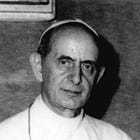
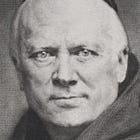
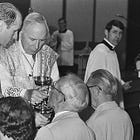
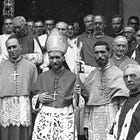
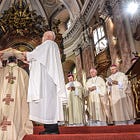
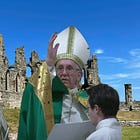
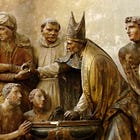
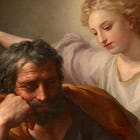
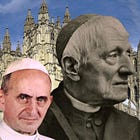
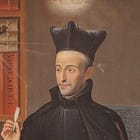
One issue I think needs more attention is the altering of the concept of what a priest or a bishop actually is in the Conciliar/Synodal Church. I was speaking with an NO priest who said his PRIMARY responsibility is the preaching of the Gospel. That is NOT what a Catholic priest does. A Catholic priest offers his life as a sacrifice, like Our Lord. Preaching the Gospel is only part of that. You cannot say that a man who is being ordained into the Conciliar priesthood intends to do what the Church does, if he intends to be a service administrator and preacher...
Excellent work. Thank you.